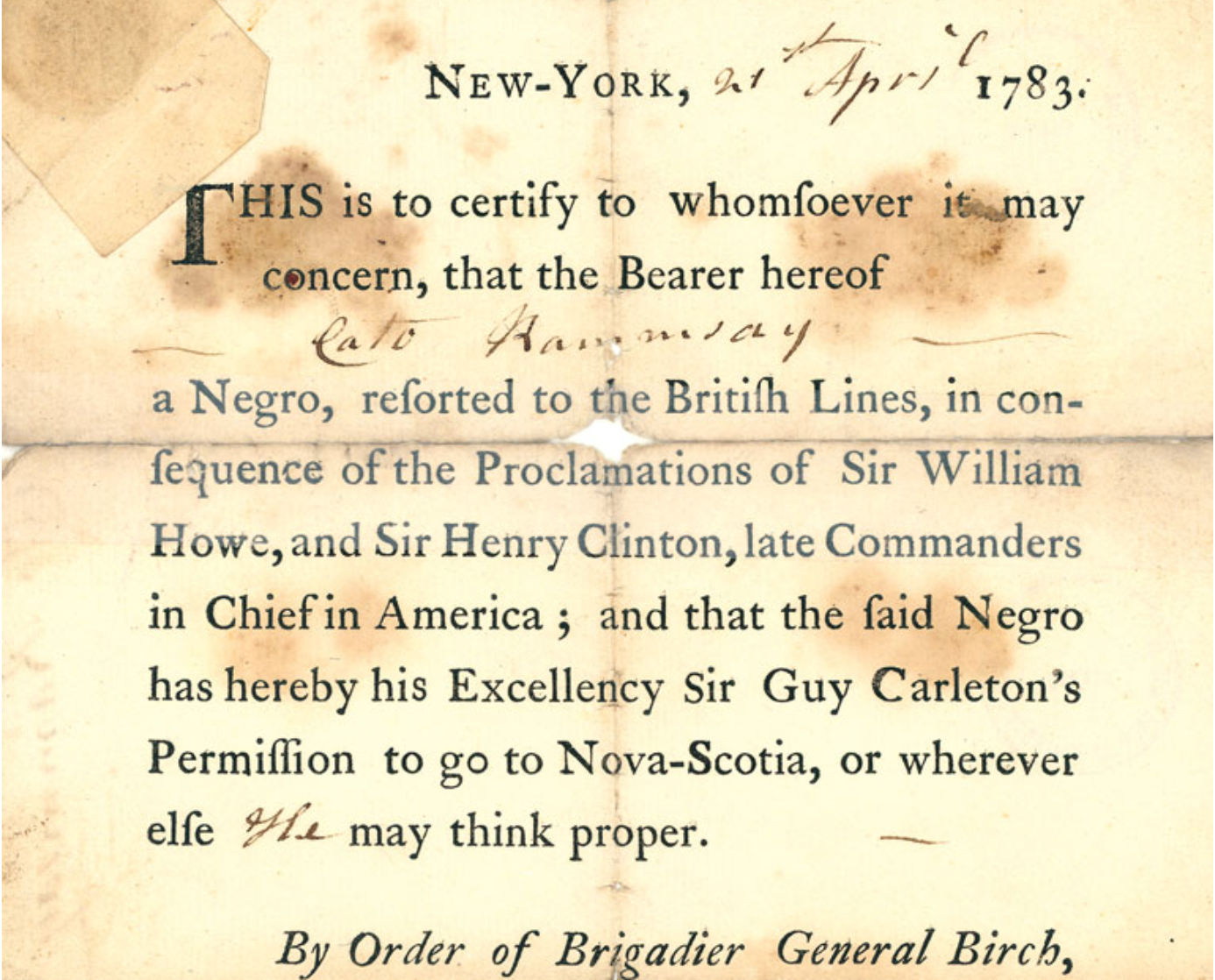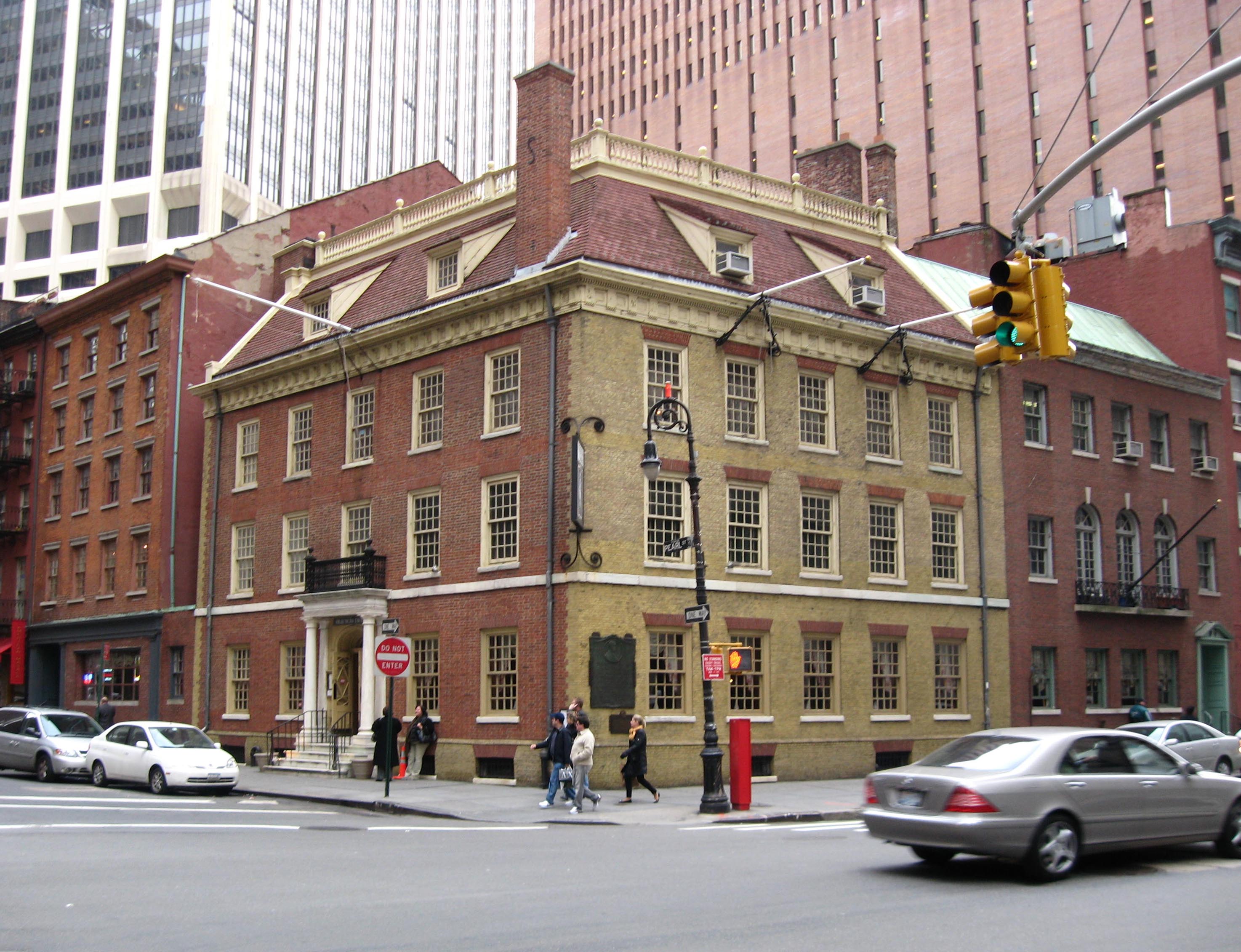The Book Of Negroes on:
[Wikipedia]
[Google]
[Amazon]
 The ''Book of Negroes'' is a document created by Brigadier General Samuel Birch, under the direction of
The ''Book of Negroes'' is a document created by Brigadier General Samuel Birch, under the direction of
 The document contains records on 3000 Africans; the former slaves recorded in the ''Book of Negroes'' were evacuated to British North America, where they were settled in the newly established Birchtown and other places in the colony. According to the Treaty of Paris (1783), the United States argued for the return of all property, including slaves. The British refused to return the slaves, to whom they had promised freedom during the war for joining their cause. The detailed records were created to document the freed people whom the British resettled in Nova Scotia, along with other Loyalists. The book was assembled by Samuel Birch, the namesake of Birchtown, Nova Scotia, under the direction of
The document contains records on 3000 Africans; the former slaves recorded in the ''Book of Negroes'' were evacuated to British North America, where they were settled in the newly established Birchtown and other places in the colony. According to the Treaty of Paris (1783), the United States argued for the return of all property, including slaves. The British refused to return the slaves, to whom they had promised freedom during the war for joining their cause. The detailed records were created to document the freed people whom the British resettled in Nova Scotia, along with other Loyalists. The book was assembled by Samuel Birch, the namesake of Birchtown, Nova Scotia, under the direction of
"First Trailer for Mini-Series Adaptation of Acclaimed 'The Book of Negroes' Surfaces"
, IndieWire, 24 June 2014.
"''The Book of Negroes''"
''African Nova Scotians: in the Age of Slavery and Abolition'', Nova Scotia Archives
''Remembering Black Loyalists, Black Communities in Nova Scotia'', 2001, Noval Scotia Museum *Cassandra Pybus
''Epic Journeys of Freedom: Runaway Slaves of the American Revolution and Their Global Quest for Liberty''
(Boston: Beacon Press, 2006).
Canadian Digital Collections, website includes link to ''Book of Negroes''
African Nova Scotians in the Age of Slavery and Abolition
(Digitized version of the British copy)
Inspection Roll of Negroes Book No. 2
(Digitized version of the American copy.)
''Carleton Papers – Book of Negroes, 1783''
(Library and Archives Canada). Searchable database of the ''Book of Negroes''. *Hodges, Graham R. ''The Black Loyalist Directory: African Americans in Exile After the American Revolution''. New York: Garland Pub. in association with the New England Historic Genealogical Society, 1996. Print version of the American copy. {{Slave narrative 1783 documents African-American documents African-American slave records African-American genealogy Black Loyalists History of Black people in Canada Sierra Leone Creole history books Krio genealogy Collection of The National Archives (United Kingdom) Fugitive American slaves American expatriates in Canada
 The ''Book of Negroes'' is a document created by Brigadier General Samuel Birch, under the direction of
The ''Book of Negroes'' is a document created by Brigadier General Samuel Birch, under the direction of Sir Guy Carleton
Guy Carleton, 1st Baron Dorchester (3 September 1724 – 10 November 1808), known between 1776 and 1786 as Sir Guy Carleton, was an Anglo-Irish soldier and administrator. He twice served as Governor of the Province of Quebec, from 1768 to 17 ...
, that records names and descriptions of 3,000 Black Loyalists, enslaved Africans who escaped to the British lines during the American Revolution and were evacuated to points in Nova Scotia as free people of colour.
Background
The first African person in Nova Scotia arrived with the founding ofPort Royal
Port Royal is a village located at the end of the Palisadoes, at the mouth of Kingston Harbour, in southeastern Jamaica. Founded in 1494 by the Spanish, it was once the largest city in the Caribbean, functioning as the centre of shipping and co ...
in 1605. African people were then brought as slaves to Nova Scotia during the founding of Louisbourg
Louisbourg is an unincorporated community and former town in Cape Breton Regional Municipality, Nova Scotia.
History
The French military founded the Fortress of Louisbourg in 1713 and its fortified seaport on the southwest part of the harbour, ...
and Halifax. The first major migration of African people to Nova Scotia happened during the American Revolution. Enslaved Africans in America who escaped to the British during the American Revolutionary War became the first settlement of Black Nova Scotians and Black Canadians. Other Black Loyalists were transported to settlements in several islands in the West Indies and some to London. Recorded in 1783, this 150-page document is the only one to have recorded Black Canadians in a large, detailed scope of work.
Contents
Sir Guy Carleton
Guy Carleton, 1st Baron Dorchester (3 September 1724 – 10 November 1808), known between 1776 and 1786 as Sir Guy Carleton, was an Anglo-Irish soldier and administrator. He twice served as Governor of the Province of Quebec, from 1768 to 17 ...
.
Some freedmen later migrated from Nova Scotia to Sierra Leone, where they formed the original settlers of Freetown, under the auspices of the Sierra Leone Company
The Sierra Leone Company was the corporate body involved in founding the second British colony in Africa on 11 March 1792 through the resettlement of Black Loyalists who had initially been settled in Nova Scotia (the Nova Scotian Settlers) after ...
. They are among the ancestors of the Sierra Leone Creole ethnic group.
Notable people recorded in the ''Book of Negroes'' include Boston King, Henry Washington
Colonel Henry Washington (1615–1664), was an officer in the Royalist army during the English Civil War.
Biography
Washington, baptised 21 March 1615, was the son of Sir William Washington and Anne, daughter of Sir George Villiers (c. 1550– ...
, Moses Wilkinson
Moses "Daddy Moses" Wilkinson or "Old Moses" (c. 1746/47 Wilkinson's entry in the Book of Negroes gives his age as 36. – ?) was an American Wesleyan Methodist preacher and Black Loyalist. His ministry combined Old Testament divination with ...
and Cato Perkins Cato Perkins was an African-American slave from Charleston, South Carolina who became a missionary to Sierra Leone.
He was enslaved by John Perkins.
Cato Perkins self-emancipated by joining the British during the Siege of Charleston and he joined G ...
.
As the ''Book of Negroes'' was recorded separately by American and British officers, there are two versions of the document. The British version is held in The National Archives in Kew, London The American version is held by the National Archives and Records Administration in Washington, D.C. It was published under the title ''The Black Loyalist Directory: African Americans in Exile After the American Revolution'' (1996), edited by Graham Russell Hodges, Susan Hawkes Cook, and Alan Edward Brown.
Representation in other media
The Canadian novelist Lawrence Hill wrote '' The Book of Negroes'' (2007, published in the United States as ''Someone Knows My Name''). It is inspired by the African Americans who were resettled in Nova Scotia, and some of them who later chose to go to Sierra Leone, where they created a colony of freedmen in Africa. He features Aminata Diallo, a young African woman captured as a child; she is literate and acts as a scribe to record the information about the former slaves. The book won the top 2008 Commonwealth Writers' Prize. Canadian director Clement Virgo adapted the book into a six-hour television mini-series of the same title. The series premiered on CBC in Canada on 7 January 2015 and on BET in the United States on 16 February 2015 and starred Aunjanue Ellis, Lyriq Bent, Cuba Gooding Jr. and Louis Gossett Jr.Tambay A. Obenson"First Trailer for Mini-Series Adaptation of Acclaimed 'The Book of Negroes' Surfaces"
, IndieWire, 24 June 2014.
See also
* Black Nova Scotians *'' Rough Crossings'' (subtitle: ''Britain, the Slaves and the American Revolution''), a history book and television series by Simon SchamaNotes
External links
"''The Book of Negroes''"
''African Nova Scotians: in the Age of Slavery and Abolition'', Nova Scotia Archives
''Remembering Black Loyalists, Black Communities in Nova Scotia'', 2001, Noval Scotia Museum *Cassandra Pybus
''Epic Journeys of Freedom: Runaway Slaves of the American Revolution and Their Global Quest for Liberty''
(Boston: Beacon Press, 2006).
Canadian Digital Collections, website includes link to ''Book of Negroes''
African Nova Scotians in the Age of Slavery and Abolition
(Digitized version of the British copy)
Inspection Roll of Negroes Book No. 2
(Digitized version of the American copy.)
''Carleton Papers – Book of Negroes, 1783''
(Library and Archives Canada). Searchable database of the ''Book of Negroes''. *Hodges, Graham R. ''The Black Loyalist Directory: African Americans in Exile After the American Revolution''. New York: Garland Pub. in association with the New England Historic Genealogical Society, 1996. Print version of the American copy. {{Slave narrative 1783 documents African-American documents African-American slave records African-American genealogy Black Loyalists History of Black people in Canada Sierra Leone Creole history books Krio genealogy Collection of The National Archives (United Kingdom) Fugitive American slaves American expatriates in Canada